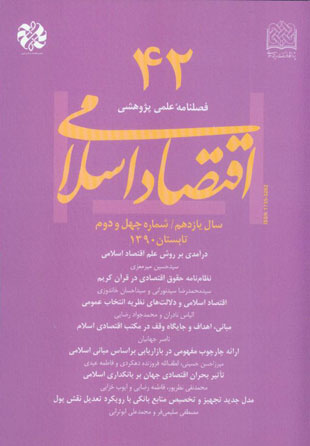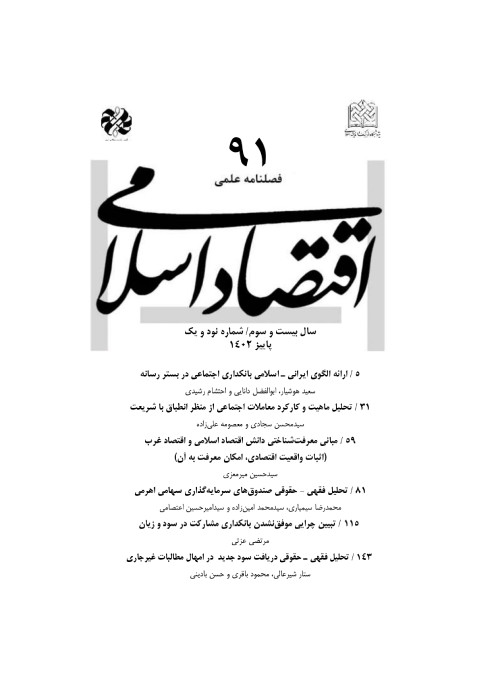فهرست مطالب

فصلنامه اقتصاد اسلامی
پیاپی 42 (تابستان 1390)
- 228 صفحه، بهای روی جلد: 40,000ريال
- تاریخ انتشار: 1390/05/18
- تعداد عناوین: 7
-
-
Page 5Sadr, Mohammad Omar Chapra, Shawqi Dunya, Anas Zarqa on nature and methodology of Islamic economics, the viewpoint of Monzer Kahf has been reviewed in detail and is proved that whom that had works in Islamic economics, have not followed the logical steps of research, and so, have not reached to consisted findings. This paper using methodological results, suggests the principals, criterion and a road map for continuing Islamic economics studies.Keywords: Methodology, Islamic economics method, Seyedmohammadbaqer Sadr, Mohammadomar Chapra, Shawqi Dunya, Anas Zarqa, Monzar Kahf
-
Page 29
-
Page 59Government as an effective institution in resource allocation has a great importance in most of economic analyzes. For this reason understanding decision process in this institution is for explaining its economic performance and evaluating its efficiency. This paper through assuming some assumptions, analysis methods and policy implications of public choice school is to evaluate literature review of this issue in Islamic economy knowledge and then with a pathological view is to derive some analytical and practical elementsof public decision making system from the viewpoint of Islam. The ultimate purpose of the paper is to emphasis this point that not only elements like process efficiency, attention to public satisfaction and opposition with corruption and rent have been recognized in Islamic sources, but also they have been advised by Shiite’s Imams.
-
Page 87Waqf (endowment) institution has not been immune from damages of religious institutions like the decrease of spiritual and just motives. Therefore the position of waqf in economic school of Islam that is responsible for motivational and goal issues, ownership, economic freedom and social justice should be reviewed and its origin in the structure of relationships between private and government sectors should be determined. The hypothesis of this paper is the exploration of waqf position and explaining this point that first, waqf in its nature is a charity and has an ethical face and therefore, the third part of the economy is responsible for waqf institution and second, it is justice and has a law face and the interests of waqif (the person whoendows), Mawqufa (the object of endowment), and mawqufʼonalayhim (whom that the endowment is devoted to them) should be regarded. So the Islamic government has the right of supervision in the frameworks of economic freedoms and social justice and also exercises the governance of the government in maintaining and enhancing interests of waqif, mawqufa and mawqufʼonalayhim. Hence, the ministry of waqf should be established in Islamic countries in order to be responsible for governing duty of government in maintaining and enhancing these interests. The methodology of research in data gathering step is of library one, in Quranic, Sunnah and juridical references is thematic analysis and in economic issues is analytical.Keywords: Third Part of Economy, Economic School of Islam, Justice, Benefaction
-
Page 117Business has such an importance in the value system of Islam that the longest verse of Quran (Bagharah: 282) has been dedicated to the details of one of economic problems i.e. business documents. Marketing philosophy is one of subjects that needs research and explanation where the western and eastern marketing philosophies have not met all the needs and material and intellectual interests of the human being and the society. Today human being looks for teachings of Islam in all fields especially in marketing. Islamic marketing as a discipline is the result of evolutions in world economy. So presenting Islamic marketing models is one of unavoidable necessities. The goal of this research is the exploitation of characteristics and aspects of Islamic marketing from the viewpoint of Quran and Sunnah and presenting a proper framework for application of it in Islamic countries. The approach of the research is mixed explorative (qualitative-quantitative). The results of analysis show that elements of Islamic marketing can be categorized in three aspects of faith-relating bases and principles, communication and instruments.Keywords: Islamic Marketing, Marketing Ethics, Islamic Principles, Values
-
Page 149World economic crisis had a significant effect on conventional banking such that this system encountered with a significant imbalance and deterioration. It is while that Islamic banking has maintained its stability during the crisis. So the evaluation of Islamic banks’ performance during the crisis and indices affecting the immunity of this system seems necessary. Therefore this paper using descriptive methodology and content analysis and library resources is to prove this hypothesis that “Islamic banking could have been immune from world economic crisis such that the amounts of Islamic banks’ assets have grown despite the crisis. The results show this fact that not only Islamic banks have maintained their stability during the crisis, but also they have experienced increasing growth rates. Banning riba-based transactions, emphasis on real contracts, investment risk distribution, relating money supply to real sector of economy, flexibility of capital raising expenses and limitation of speculative activities are among the reasons for this immunity.Keywords: Financial Crisis, Conventional Finance, Islamic Banking
-
Page 181
Also usury-free banking Act since its legislation and application has had notable results, but encounters with many challenges and critics. It seems that one of reasons for these problems is the inflation in Iran’s economy that has significantly affected the Islamic contracts. This paper is a try to present a new model of finance and distribution of banking resources that is efficient in inflation conditionin one hand and in the other hand is a model that can be criticized and completed as a part of Islamic-Iranian pattern of improvement. The methodology of the paper is descriptive-analytical. The suggested model proposes the finance and distribution of resources based on portfolio of financial assets instead of monetary amounts. So in this paper in addition to describing the suggested model and explaining its advantages in practice, the relationship between the changes of general price levels and changes of gold coin prices and dollar prices in Iran has been tested through auto-regressive approach with distributive lags. The results show that gold can be a proper alternative in maintaining the value of money while because of ordered price determination system by the central bank and unreal value of it in the internal market; dollar does not have this ability.
Keywords: consumer price index, money, gold, dollar, inflation, usury, free banking


